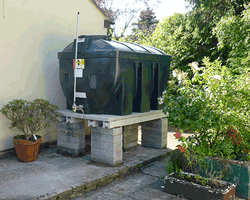Oil Tanks for domestic heating oil
In rural areas many householders have an oil tank for their heating supplies. Oil leaks can occur which can be very costly and difficult to clean up.
If you have an oil tank it is important that you check your household insurance to make sure your policy covers leaks, damage to your property, your neighbours' property and impact to the environment from an oil leak.

How could I prevent a leak?
-
Check your tank regularly for deterioration, for example corrosion, bulging or signs of interference. Oil is a valuable commodity and theft from tanks is on the increase.
-
Have your system regularly serviced and checked (tank, pipework and boiler) by an OFTEC registered technician.
-
Become familiar with how much oil you use and if you think your consumption has increased check the system for leaks.
-
Know where your underground pipework runs so that damage to it can be prevented for example from stakes or even just digging in the garden.
-
Wherever possible try and supervise oil deliveries, especially if the delivery driver cannot see your tank during filling.
-
Get new tanks installed by OFTEC registered technicians.
See the Home guide to domestic liquid fuel storage on the OFTEC website for more information. -
Ensure that your tank is in a suitable location and as far away as possible from streams and sources of water supplies.
Can an oil leak affect my health?
A leak of oil in or near your house can give off fumes which can produce symptoms like:
- Feeling drunk, sleepy or fuzzy headed
- Headaches
- Nausea
- Sore throats
- Skin Rashes
Oil can also penetrate underground drinking water pipes and taint the water supply, kill lawns and vegetation or even soak into brickwork and foundations.
How can I tell if I've got a leak?
Signs of an oil leak can be:
- a strong oily smell inside or outside your house especially in any cupboards;
- black stains on the tank supports or on the ground near the tank;
- dead plants and grass around the tank;
- a sudden increase in the quantity of oil you are using.
I think I've got a leak what should I do?
-
Try and find out where the leak is coming from and stop any more leaking. Switch off the oil supply at your tank. Consider whether you need to get the tank emptied as a matter of urgency. Your oil delivery company may be able to help with this.
-
Arrange for a competent person to repair the leak as soon as possible.
-
Prevent any oil from entering drains by blocking its flow with earth, sand or commercial oil absorbent products.
-
Call your insurance company to inform them of the leak and start the claim for the cost of repair and clean up. They will usually instruct their loss adjustors to contact you to organise specialists to assess the scale of the problem and recommend remedial works.
-
Make sure you keep any children and pets away from the affected area.
-
Never use detergents or a hose to wash the oil away as this can make the problem worse.
-
If you are worried that the leak could affect a stream, contact the Environment Agency on their incident hotline 0800 80 70 60 (Freephone, 24 hour service).
-
If there is a strong smell of oil in your home open the windows and doors to keep it ventilated. Contact the Environmental Protection Team.
-
If your water supply seems to taste or smell of oil, contact water supplier either United Utilities or Northumbrian Water. You can also contact the Environmental Protection Team on the details below.
Report a problem on the United Utilities website if you are concerned with the quality of your water supply.
Report a problem on the Northumbrian Water website if you are concerned with the quality of your water supply.